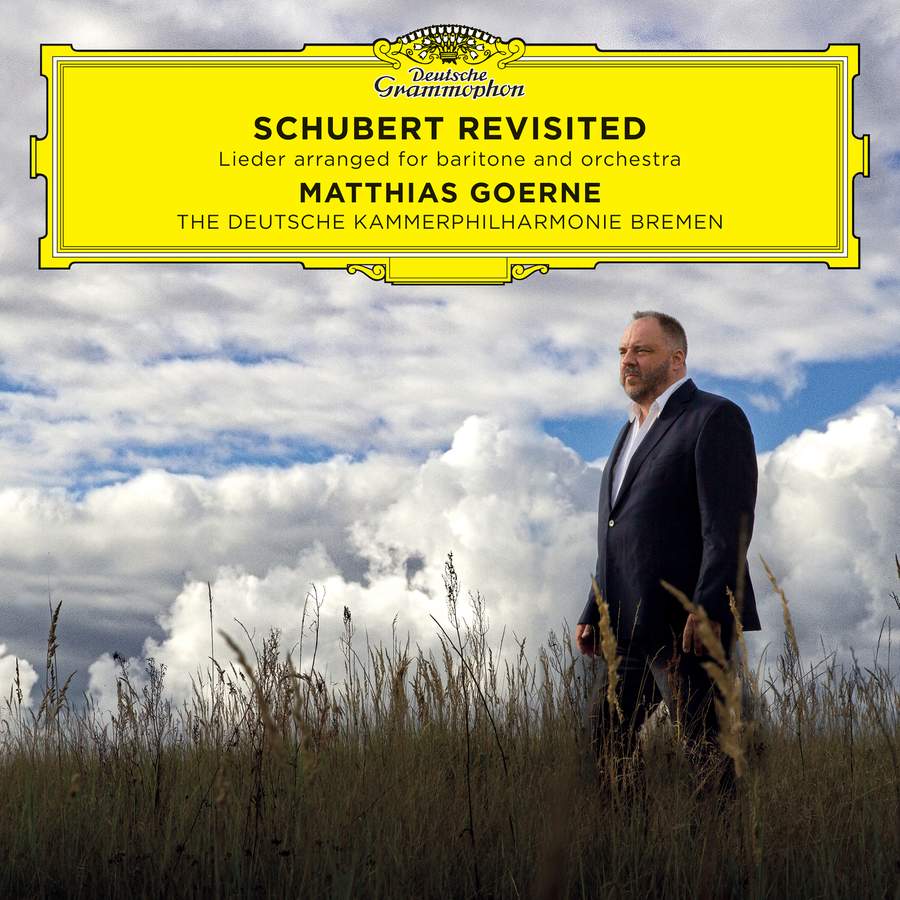Matthias Goerne: Schubert Revisited
View record and artist detailsRecord and Artist Details
Genre:
Vocal
Label: Deutsche Grammophon
Magazine Review Date: 03/2023
Media Format: CD or Download
Media Runtime: 75
Mastering:
DDD
Catalogue Number: 483 9758

Tracks:
| Composition | Artist Credit |
|---|---|
| Abendstern, 'Evening Star' |
Franz Schubert, Composer
Deutsche Kammerphilharmonie, Bremen Matthias Goerne, Baritone |
| Alinde |
Franz Schubert, Composer
Deutsche Kammerphilharmonie, Bremen Matthias Goerne, Baritone |
| An die Entfernte |
Franz Schubert, Composer
Deutsche Kammerphilharmonie, Bremen Matthias Goerne, Baritone |
| An Silvia |
Franz Schubert, Composer
Deutsche Kammerphilharmonie, Bremen Matthias Goerne, Baritone |
| Erlkönig |
Franz Schubert, Composer
Deutsche Kammerphilharmonie, Bremen Matthias Goerne, Baritone |
| Fahrt zum Hades |
Franz Schubert, Composer
Deutsche Kammerphilharmonie, Bremen Matthias Goerne, Baritone |
| (Des) Fischers Liebesglück |
Franz Schubert, Composer
Deutsche Kammerphilharmonie, Bremen Matthias Goerne, Baritone |
| Ganymed |
Franz Schubert, Composer
Deutsche Kammerphilharmonie, Bremen Matthias Goerne, Baritone |
| Harfenlieder I - III |
Franz Schubert, Composer
Deutsche Kammerphilharmonie, Bremen Matthias Goerne, Baritone |
| Grenzen der Menschheit |
Franz Schubert, Composer
Deutsche Kammerphilharmonie, Bremen Matthias Goerne, Baritone |
| (Das) Heimweh |
Franz Schubert, Composer
Deutsche Kammerphilharmonie, Bremen Matthias Goerne, Baritone |
| Pilgerweise |
Franz Schubert, Composer
Deutsche Kammerphilharmonie, Bremen Matthias Goerne, Baritone |
| Schäfers Klagelied |
Franz Schubert, Composer
Deutsche Kammerphilharmonie, Bremen Matthias Goerne, Baritone |
| Schatzgräbers Begehr |
Franz Schubert, Composer
Deutsche Kammerphilharmonie, Bremen Matthias Goerne, Baritone |
| Stimme der Liebe |
Franz Schubert, Composer
Deutsche Kammerphilharmonie, Bremen Matthias Goerne, Baritone |
| (Der) Tod und das Mädchen |
Franz Schubert, Composer
Deutsche Kammerphilharmonie, Bremen Matthias Goerne, Baritone |
| Wandrers Nachtlied I |
Franz Schubert, Composer
Deutsche Kammerphilharmonie, Bremen Matthias Goerne, Baritone |
Author: Richard Wigmore
As Schubert’s posthumous fame grew, his most popular songs – which usually meant those published in his lifetime – received wider exposure in orchestral arrangements by Berlioz (a demonically glittering ‘Erlkönig’), Liszt, Brahms et al. In a later age Max Reger and the young Anton Webern catered to the growing fashion for orchestral songs, while nearer our own time that ardent Schubertian Benjamin Britten made a witty version of ‘Die Forelle’. Now Matthias Goerne’s longtime pianist partner Alexander Schmalcz has taken up the tradition in arrangements of 19 Schubert songs that range from favourites such as ‘An Silvia’ and ‘Erlkönig’ to rarities such as the picturesque ‘Das Heimweh’ – a compressed vocal symphony – and the ecstatic ‘Stimme der Liebe’.
It’s easy to object that no orchestral realisations can match the suggestive power of Schubert’s piano-writing, so often evocative of other sound worlds. But from the opening ‘An Silvia’, with its soft trumpet and delicate woodwind echoes, Schmalcz finely balances discretion and colouristic imagination. Apart from wisps of cajoling countermelody for the Erlking’s blandishments, he leaves Schubert’s actual notes unmolested. But time and again he captivates the ear with his apt choice of sonority: deep trombone colour to enhance the antique solemnity of Death’s utterances in ‘Der Tod und das Mädchen’; muffled, faintly eerie tones, including cor anglais, natural horn and double bass harmonics, in the Harper’s songs; a muted viola to paint the ‘pale night mists’ in the mysterious barcarolle ‘Des Fischers Liebesglück’, and so on.
Given Goerne’s vocal timbre, it’s no surprise that slow, sombre songs, usually in the minor key, predominate. But his trademark concentration of feeling, allied to Schmalcz’s subtly changing colourings, ensures that the attention is held throughout. Unscathed by his Wagnerian forays, Goerne’s voice remains mellow and rounded, his sense of style impeccable. Instrumentalists could – and for all I know do – learn from his perfectly bound legato and natural feeling for the shape of a Schubertian phrase. Nothing is harsh or forced, even when he taps new reserves of power in the climaxes of ‘Grenzen der Menschheit’ – a performance of this mighty song that mingles compassion and majestic authority. Schmalcz complements the philosophical gravitas of Goethe’s poem with louring low brass, including a tuba. Yet here and elsewhere he is careful to keep the instrumental textures lucid, abetted by the lean, rhythmically precise playing of the superb (and conductorless) Bremen orchestra.
Needless to say, Goerne is in his element in the aching tenderness, flaring to bitter accusation, of the three Harper’s songs. In the final ‘An die Türen will ich schleichen’, scored with muted strings, the old man has become almost childlike in his acceptance and dependency. Goerne sings it, aptly, as if in a trance, with barely a nuance in the vocal line.
Some of Goerne’s tempo choices are unusual. The Goethe prayer for inner peace ‘Wandrers Nachtlied’ is by some way the fastest performance I’ve heard, yet unfolds, mesmerically, in a single concentrated span. ‘Pilgerweise’, where Schubert triumphs over his friend Schober’s sentimental verses, is less a dirge than a gently plaintive valse triste, coloured by pizzicato strings and characteristic flecks of woodwind. And more than on his previous Schubert albums, Goerne can lighten up when the spirit demands: say, in a relaxed, intimate ‘An Silvia’ (the arching final phrase perfectly ‘bowed’) or a gracefully caressed ‘Des Fischers Liebesglück’, altogether more varied and inviting than his sombre performance with Elisabeth Leonskaja (Harmonia Mundi, 5/08). Another rarity, the yearning Goethe setting ‘An die Entfernte’ (where would the German song edifice be without distant love?), sets the seal on a flawlessly executed programme that by turns intrigues, moves and delights.
Discover the world's largest classical music catalogue with Presto Music.

Gramophone Digital Club
- Digital Edition
- Digital Archive
- Reviews Database
- Full website access
From £8.75 / month
Subscribe
Gramophone Full Club
- Print Edition
- Digital Edition
- Digital Archive
- Reviews Database
- Full website access
From £11.00 / month
Subscribe
If you are a library, university or other organisation that would be interested in an institutional subscription to Gramophone please click here for further information.




